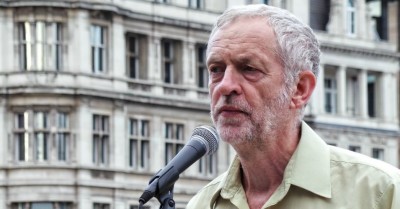Incoherence and Bombing Mania in the British Parliament

“Cameron’s approach is bomb first, talk later.” – Jeremy Corbyn, British Labour leader, The Guardian, Dec 2, 2015
The floundering political establishment in Britain has been engaged in near vicious debates about whether an ineffectual contribution to the Coalition force air campaign against the Islamic State in Syria should be made. French brothers and sisters have been in the firing line, suggested Prime Minister David Cameron. Action should be taken aid the bloodied tricolore.
The government motion to be voted upon later today has been published, and reveals a mentality of extended conflict, with a good deal of fodder being cast to the howling dogs of war.
ISIL is deemed “a direct threat to the United Kingdom”; support is given to UN Security Council Resolution 2249 that the organisation constituted an “unprecedented threat to international peace and security” that required “all necessary measures” to be taken to prevent terrorist acts on its part and to “eradicate the safe haven they have established over significant parts of Iraq and Syria”. The motion duly stresses support for the Cameron’s government “in taking military action, specifically airstrikes, exclusively against ISIL in Syria”.[1]
The hawkish sentiment is being more fuelled by the day. Opponents of an expanded air operation are being hounded and blackmailed. Even the morning program on BBC Radio Four attempted this morning, in rather shoddy fashion, to make the false distinction between morality and effect. (Good gracious, morning deontology versus utilitarian bombing arguments!) Part of the problems with perceived humanitarian interventions or military engagements to repel a supposedly international threat lie precisely in their false presumptions: a bombing campaign can itself be moral, and have suitable effect on the ground.
The only actual effect is bloodshed against an enemy that knows no frontlines, and has drawn enormous support from the consequences of fateful decisions in the Middle East. In the case of Islamic State, a double narrative is being constantly circulated: the fundamentalist threat is metastasising like political cancer on the one hand; on the other, it is being wound back precisely because the air campaign, notably from such countries such as Russia, has intensified. Truly aggressive chemotherapy indeed and other powers feel left out.
Much of the Commons role in this is theatre without consequence. Three or more sorties against Islamic State targets, acknowledge many British voices, will hardly push the issue. “Bombing Raqqa,” suggests Labour’s Jeremy Corbyn, “won’t solve the problem.” And the refusal on the part of Cameron and the Bush administration to contemplate Assad in any negotiated settlement is self-inflicted handicap. It is a policy problem insulated in a laboratory of failings.
The one loud voice against expanding the campaign against Syria has been Corbyn. The prime minister has essentially stopped short of calling him a traitor, preferring the term “terrorist sympathiser” as a rallying call that he hopes will carry the motion across the line. “You should not be walking through the lobbies with Jeremy Corbyn and a bunch of terrorist sympathisers,” claimed Cameron before a meeting of the 1922 committee.
This is all rather smelly stuff, given the fact that Cameron has his own terrorist brigades whom he would prefer to supply. The only problem is that such fictitiously moderate elements tend to vanish when considerations on the ground are taken into account. Out of the ether, come al-Nusra, ISIS and a kaleidoscopic array of Islamic brigades.
Corbyn’s mouth in this debate is regarded as dirty – the trash-talker of peace where peace has been, if not banished, then certainly placed on the longest of sabbaticals. Given that the hawks from all sides are running the debate, his opinions ring as realistic assertions about the inevitable. If you want to bomb, show us prospects of actual success in curbing the threat. On that score, not to mention a range of logistical issues, Cameron comes up short.
As the Labour leader penned in the hope of swaying parliamentarians, “On planning, strategy, ground troops, diplomacy, the terrorist threat, refugees and civilian casualties, it’s become increasingly clear the prime minister’s proposal simply doesn’t stack up.”[2]
The House of Commons foreign affairs select committee has also been critical of the PM’s bombing fetish. They have deemed it shallow, artificially segmented from the broader issues of the civil war itself. “We asked the Foreign Secretary,” went one of the questions from the committee, “whether ISIL could be defeated without a resolution to the civil war. He told us it could.”
Committee members, however, noted how their “witnesses complained about a lack of joined-up strategy to tackle closely interlinked crises.”[3] Sir Simon Mayall, being one such expert witness, suggested that any issue of extended air strikes should also be “linked to a much firmer strategic set of policy assumptions,” one set upon “political, diplomatic, humanitarian as well as military” considerations.
Corbyn’s attempt to keep his own irritable shadow cabinet has forced his hand. Rather than retaining a united force against bombing Syria, Corbyn had to consider a free vote on the subject. The Liberal Democrats, ever the party of shallow compromise, may well throw their lot in as well.
There are enough members of parliament who want an expanded war. They may well get their wishes, despite the rather damning words from the foreign affairs select committee. “In the absence of [a clear international strategy that has a realistic chance of defeating ISIL and of ending the civil war in Syria] taking action to meet the desire to do something is still incoherent.”
Dr. Binoy Kampmark was a Commonwealth Scholar at Selwyn College, Cambridge. He lectures at RMIT University, Melbourne. Email: [email protected]
Notes

